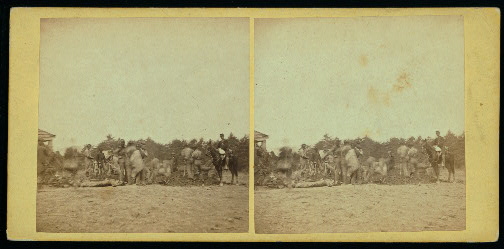
Fig. 8 1st Heavy Artilley
burying the dead at Mrs. Alsop's House, Pine Forest near Spottsylvania
Court House, after the battle of 19th May, 1864.
About
the South Danvers Wizard
Overview:
Jan.- July 1864
About
South Danvers (Peabody), Massachusetts
|
South Danvers Wizard, 6/8/1864,
p.1/ 4-5
LETTER FROM WASHINGTON [Original] – “Washington, D.C., May 28, 1864,
Mr. Dear Wizard – The First Massachusetts Heavy Artillery, (the old 14th)
which has until recently been doing duty in the forts around Washington
was ordered to the front some two weeks ago and soon had occasion to try
its mettle against Lee’s well trained veterans, and you are aware that
their first battle was a fierce one, but the result reflected nothing but
credit upon the splendid regiment. – When the 1st Mass. and 1st Maine Heavy
Artillery started from this city equipped as Infantry, to take a more active
part in the bloody conflict, the former over 1800 and the latter over 2000
strong, each of them looked more like a brigade than a regiment, and elicited
praises at their fine appearance from all who saw them. I conversed
with a number of them, as they halted to rest on their way to learn with
what heart they went forward to their first battle, and found that their
comparative inactivity had not weakened in them the true spirit of a soldier.
They said to me, ‘We have been in the service nearly three years, during
most of which time we have performed easy duty in healthful and comfortable
quarters and now we cannot complain if we are placed where the hardest
work is to be done.’ On the 19th inst., in the attack upon our trains,
they made good all which this response implied, and did their full part
to hurl back the rebels with very considerable loss in killed, wounded
and prisoners. I have been this afternoon to visit some of the wounded
from the 1st Mass. Heavy Artillery, of whom there are now over 260 in the
hospitals of this city, and learned many facts in regard to the battle
in which they participated but as you have already had a general account
of that fight I will not attempt a description of it. Many of these
men were wounded by rebel sharpshooters, who were concealed in the tops
of trees, some of whom came tumbling down like squirrels when our men discovered
their leafy haunts. It was hot work and at close quarters, as the
heavy loss which the regiment sustained well attests; but the complete
repulse of the rebel attack makes lighter the sufferings of the wounded,
as their cheerful countenances, while they relate the particulars of the
fight, almost forgetting for a time their fresh and gaping wounds, shows
plainly to the listener.
The hospitals of Washington are, I believe, as comfortable,
as well attended and regulated, as complete as that can conduce to the
comfort and speedy recovery of their inmates as any in the world.
There is probably scarcely a ward in them all which is not daily visited
by some noble hearted woman, who consecrates her hours to this most holy
work – to those sacred and most appropriate offices for which she is fitted
by her nature, and which no one else can half as well perform. Her
very presence seems to change the atmosphere of a whole ward, to touch
each sufferer with a soft and magic spell, and carry with it the light
and breath of home. Stand and watch, as I have done, when she enters
some ward with perhaps forty or fifty patients in it. Each ear deadened
to harsher sound, catches the soft step or the rustling of her dress, as
our attention is often fixed by a whisper while we are indifferent to louder
tones; each eye turns to catch her gentle, sympathetic moves from couch
to couch, neglecting none, but smoothing a pillow or administering medicine
here, speaking a cheerful word or touching a burning forehead there until
every sufferer feels as if a cordial of unwonted virtues had touched his
lips, or the cherished vision of reunion with those at home, were more
dear to him than life itself were almost realized. A hospital without
woman is like a ‘home without a mother’. When no other women have
been present I have seen the ‘Sisters of Mercy’ with characteristic zeal,
devote themselves day and night to this noble mission and they seemed to
wish no other source of happiness. How great reward is the consciousness
of doing good!
Quite a number of the wounded of the 1st Mass. Heavy
Artillery will soon be transferred to Philadelphia and some who do not
require much attention from the surgeons, will be furloughed.
I have not been able to learn the number of killed
in this regiment but Company ‘C’, which probably suffered as much as any
other, lost nine , including Michael Fitzgerald and Chas. Jarvia of Lynn;
_____ Chipman, Samuel Fairfield and John Bickford of Salem. Among the wounded
now here are: Sergt. J. P. Withey, of Danversport, Armory Square Hospital;
Samuel B. Bond, of Lynn, Judiciary Square Hospital; Simeon Murray, of Danvers,
Lincoln Hospital; Charles Hillery (sick) of Danvers, Columbia Hospital;
Eben W. Howard, of Salem, Armory Square Hospital; Geo. P. Furgerson, of
Salem, Mt. Pleasant Hospital; N. D. Pitman, of Salem, Mt. Pleasant Hospital;
Frank Magee, of Marblehead, Armory Square Hospital; P. C. Lavelette, of
Ipswich, Emory Hospital; John J. Fowler, of Ipswich, Mt. Pleasant Hospital;
L. M. Blaisdell, of Ipswich, Finley Hospital; Corporal C. B. Hardy, of
Ipswich, Judiciary Square Hospital; Samuel Merrill, of Ipswich, Harwood
Hospital; Corp. O. E. Burnham, of Essex Campbell Hospital; H. N. Andrews,
of Essex, Emory Hospital.” Signed “Yours, etc., DELTA” |

